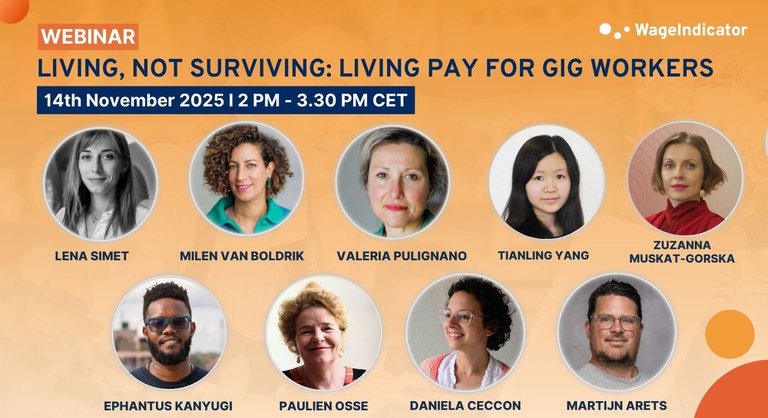About the event
How to calculate a pay floor for platform workers? For employed workers, there are established methods for determining a minimum pay: the Minimum Wage, wages agreed in a collective labour agreement, or a Living Wage. These methods cannot be directly applied to self-employed workers, a category that represents 46% of the global working population.
For self-employed workers, the costs and risks that are borne by the employer in an employment relationship are the responsibility of the individual professional. If a self-employed platform worker wants to earn a fair rate, these costs and risks must be included in the calculation of the rate
The need for this discussion is fuelled again by the rise of the gig economy, where work is broken down into isolated tasks and risks and costs are often shifted onto the shoulders of the individual worker. In Europe alone, the number of platform workers is expected to rise from 28,3 million in 2022 to 43 million in 2025. The discussion about decent pay for all workers becomes more urgent. It is also part of the upcoming ILO Platform Work Convention. But how do you calculate this for self-employed workers? What do you include? And what do you exclude? And who is responsible for negotiating, implementing and enforcing this?
In this dynamic webinar, we explored this issue with experts from academia and practice. We discussed how pay floors are calculated in the labour market, why a decent remuneration for employed and self-employed workers is important and how Living Tariff, based on the established Living Wage methodology, could work. Finally, we talked with international organisations who have actually achieved a minimum pay floor for self-employed workers.
Date and Time
Friday, 14th of November | 2 - 3:30 PM CET
Agenda
Welcome
2:00 - 2:05 PM
Introduction
2:05 - 2:20 PM
 |
Paulien Osse is the Living Wages Global Lead at the WageIndicator Foundation. Pay Floors: How They Are Set and What Impact They Have |
Roundtable discussion and Q&A session on the importance of Living Pay
2:20 - 2:40 PM
 |
Lena Simet is a senior researcher on poverty and inequality at Human Rights Watch, where she investigates how economic, fiscal, and social policies affect human rights—especially in relation to social protection and the changing world of work. Her recent work examines platform labour, wage insecurity, and technology’s impact on workers’ rights. Before joining Human Rights Watch, Lena led the Global Urban Futures Project at The New School, a research initiative on inequality, jobless growth, and climate change. She has also served as a consultant to the United Nations, including as a lead author of a Human Development Report. She holds a PhD in Public and Urban Policy from The New School, where she taught graduate courses in development economics, and is the author of Cities and Economic Inequality in Latin America (2022). Lena Simet on Linkedin |
 |
Zuzanna Muskat-Gorska works as Legal Officer for the International Trade Union Confederation (ITUC), a global organisation which represents 191 million workers in 169 countries and territories. She supports the organisation’s legal advocacy before the International Labour Organisation and other international institutions and tribunals and advises national trade unions on labour law and policy. She is currently part of the Workers’ Secretariat supporting the standard-setting discussion on decent work in the platform economy at the International Labour Conference, Geneva, 2025-2026. |
Roundtable discussion & Q&A on how to set a living pay for self-employed workers
2:40 - 3:00 PM
 |
Valeria Pulignano is a Professor in Sociology at the Centre for Sociological Research (CESO) at KU Leuven. She has published extensively on topics related to the sociology of work, comparative European industrial (employment) relations, labour markets and inequality, working conditions, job quality and workers’ voice. She serves as Principal Coordinator of the research network on Work, Employment and Industrial Relations within the European Sociological Association. She is PI of an ERC Advanced Grant ResPecTMe, where she studies the forms of unpaid labour in the platform economy, creative industries, and care, and how these account for, and develop a measurement of, precarious work. Valeria Pulignano on LinkedIn |
 |
Daniela Ceccon is the Data Director at the WageIndicator Foundation. From Living Wage to Living Tariff: Setting a Cost of Living-Based Rate for Self-Employed Gig Workers |
Roundtable discussion & Q&A on examples of successful interventions
3:00 - 3:20 PM
 |
Milen van Boldrik has worked as an advocate for the Dutch Association of Journalists (NVJ) for almost eight years, campaigning for fair and transparent working conditions for freelance journalists. She translates the concerns and experiences of independent media professionals into concrete improvements, from rate tools and Fair Practice Codes to agreements that truly make a difference. It is the prospect of improving conditions for independent journalists that drives her. Milen van Boldrik on LinkedIn |
 |
Tianling Yang is a doctoral researcher in the research group "Data, Algorithmic Systems and Ethics" at the Weizenbaum Institute and at Technische Universität Berlin. Her research focuses on social and institutional contexts of the production of machine learning datasets, as well as actors and stakeholders in the global AI supply chains. |
 |
Ephantus Kanyugi is the Vice President of the Data Labelers Association. Ephantus has worked in the field of data annotation since 2018. He is committed to creating growth opportunities and fostering a supportive community for all members. Ephantus Kanyugi on LinkedIn |
Concluding remarks
3:20 - 3:30 PM
 |
Martijn Arets is a gig economy researcher associated with the WageIndicator Foundation. Martijn Arets on LinkedIn Martijnarets.com Webinar organiser and moderator |

